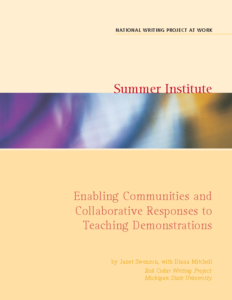Author: Janet A. Swenson, Diana Mitchell
Summary: This monograph explains a useful protocol developed by Red Cedar Writing Project for responding to demonstrations in the Summer Institute, called the Collaborative Responses to Teaching Demonstrations (CRTD). This response takes the form of a letter to the person offering the demonstration, thus providing responders with opportunities to draft and revise a piece with a clear audience and purpose. The monograph includes discussions of each aspect of the protocol, as well as tools to help prepare teachers for response, both prior to and during the Summer Institute.
Original Date of Publication: 2006
Demonstrations are a mainstay of summer institutes, but Janet Swenson and Diana Mitchell noticed that responses to demonstrations lacked the energy and thoughtfulness that characterized other activities in the summer institute. So they created a protocol for responding that elicited perceptive and thorough responses. The heuristic they developed, called Collaborative Responses to Teaching Demonstrations (CRTD), takes the form of a letter to the person offering the demonstration and includes such sections as “Elements of Best Practices” and “Standards and Benchmarks.”
Related Resources
- Toward a Scholarship of Teaching Practice: Contributions from NWP Teacher Inquiry Workshops
- Ten Prompts to Help Turn Your Demonstration into an Article
- Digging Deeper: Teacher Inquiry in the Summer Institute Demonstration
Original Source: National Writing Project, https://www.nwp.org/cs/public/print/resource/2364
